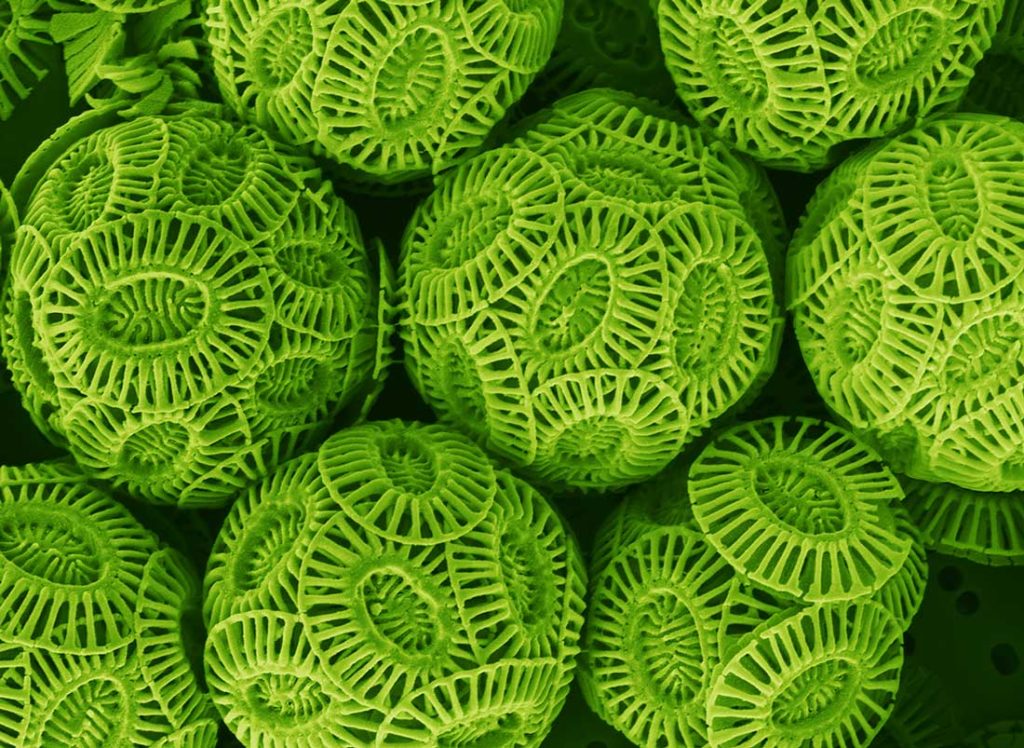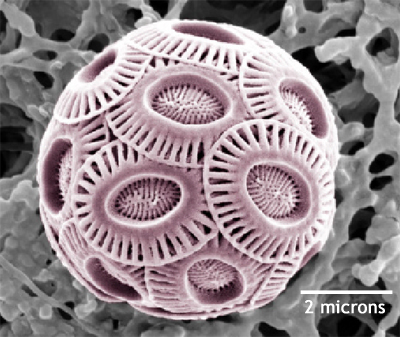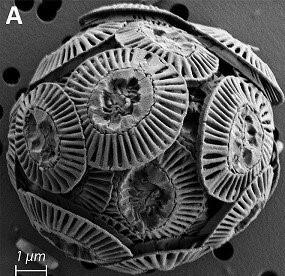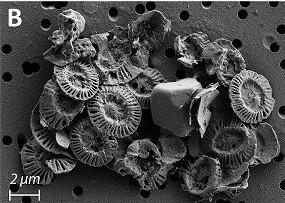
Source: UCLA|Photo via hhmi.org
Increases in ocean acidity are damaging the first link in the food chain, a microorganism called coccolithophores. This is causing major impacts to marine species that rely on coccolithophores as their primary source of food.
Recent research from the Universitat Autonoma de Barcelona’s Institute of Environmental Science and Technology illustrates how ocean acidification is affecting coccolithophores, and thus, how ocean acidification is affecting the food chain as a whole.
Background Information: What is Ocean Acidification?
Full Study: Nutritional response of a coccolithophore to changing pH and temperature (Association for the Sciences of Limnology and Oceanography (ASLO) Aug 2022).
How Ocean Acidification Decreases the Nutritional Content of Coccolithophores

Coccolithophores, part of the phytoplankton family, are single-celled plant-like marine microorganisms that are commonly found close to the surface of the ocean. Despite their microscopic size, coccolithophores play an important role in the marine food chain by serving as its foundation. Many small marine animals rely on coccolithophores as their primary source of food and energy. Even small fish and other organisms that do eat other things, like worms or small crustaceans, feed on coccolithophores when other sources of food are scarce. Marine animals obtain nutrition and energy from coccolithophores’ fat content, known as lipids.
Coccolithophores build protective scale-like platings around themselves known as coccoliths (the oval platings shown in the image to the right). These coccoliths are made of limestone (calcite). However, ocean acidification makes it much more difficult for organisms to build calcite shells.
A 2022 study conducted by researchers from the Universitat Autonoma de Barcelona’s Institute of Environmental Science and Technology, in collaboration with the Roscoff Marine Station of France, discovered that ocean acidification has significantly reduced coccolithophores’ ability to build shells, and decreased the nutrient content in their bodies. This has massive cascading effects throughout the food chain. Here’s what you need to know about it.
- The researchers created a simulation of future climate conditions, causing ocean warming and triggering ocean acidification.
- At first, the coccolithophores showed resilience to the increase of ocean temperatures and acidity. The researchers even observed an increase in their population.
- As the experimental ocean acidity spiked, the researchers found that coccolithophore population growth halted as the organisms began to struggle to build their shells. The acidic conditions caused the coccolithophores’ protective platings (coccoliths) to collapse. While this may seem beneficial to organisms that eat coccolithophores (because this makes them easier to eat and digest), this breakdown of their shells comes with other negative consequences.
- Researchers also discovered that when coccolithophores were exposed to acidified ocean conditions, the nutritional content in their bodies significantly decreased. As acidification worsens, this reduced nutrient content may have a detrimental impact on the food chain. Marine species that rely on coccolithophores for food, such as smaller fishes and zooplanktons, would be forced to feed on nutritionally deficient food.
- Researchers concluded that as ocean acidification affects coccolithophores’ energy and nutrients, coccolithophores may also seek lower-acidity areas to try and slow ocean acidifications’ effects on their survival. This movement will pose an extra threat to marine species that rely on coccolithophores for food, as some may be unable to “follow” coccolithophores to lower-acidity conditions..
The images below show the comparison of healthy coccolithophores (a) and collapsed coccolithophores due to ocean acidification (b).
Sources:
“Ocean warming and acidification impact marine food web” Universitat Autonoma de Barcelona, Nov 2022
“Ocean warming and acidification impact the marine food web, study finds” Phys Org, Nov 2022
https://phys.org/news/2022-11-ocean-acidification-impact-marine-food.html
“Nutritional response of a coccolithophore to changing pH and temperature” Association for the Sciences of Limnology and Oceanography (ASLO) Aug 2022
https://aslopubs.onlinelibrary.wiley.com/doi/10.1002/lno.12204

